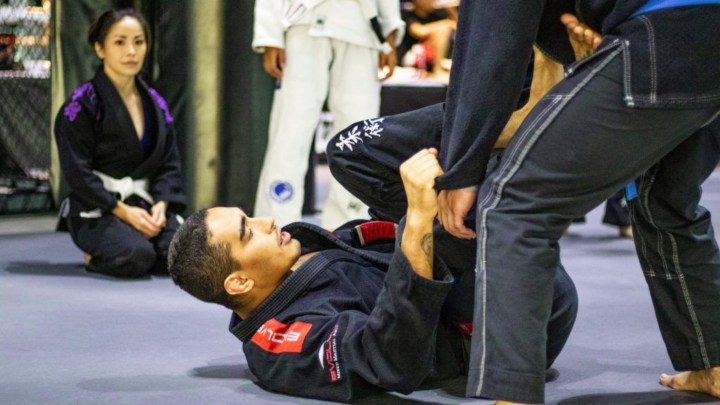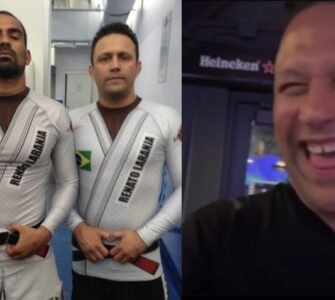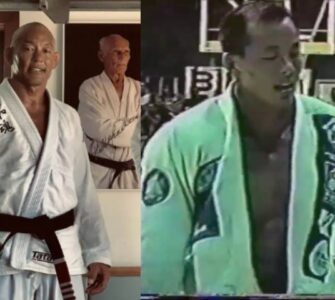Guest post by Evolve MMA, Asia’s premier championship brand for martial arts. It has the most number of World Champions on the planet. Named as the #1 ranked martial arts organization in Asia by CNN, Yahoo! Sports, FOX Sports, Evolve MMA is the top rated BJJ gym in Singapore.
For the vast majority of Brazilian Jiu-Jitsu (BJJ) practitioners, the sport is merely one aspect of life, juggled in with the responsibilities of family, friends, and work. As most of us can’t train all day like the pros can, it is important to optimize our time on the mats to gain as much skill as we can in the limited time available. In an attempt to help you do just that, we have put together a list of steps you can take to help increase your rate of improvement, making the most out of your training.
1) Take Notes
One of the downsides of BJJ being so much fun is that we often rush from roll to roll, causing us to completely forget the micro-lessons we learned during each individual match. One way of avoiding the constant “blur” of a training session is to take a small break in between each roll and jot down what worked for you, what went wrong, and how you could have been more efficient. It doesn’t have to be a lengthy paragraph, just a few bullet points highlighting the more noticeable aspects of the engagement. This will allow you to look back on your notes after your training session and identify exactly what you need to be working on.
After you have a sparring match with your training partner, you should be jotting down what you attempted to do, and what happened. If your partner wasn’t able to defend your attack, explain why you think that is. For example, some of your notes might read “passed my opponent’s guard using a leg drag, but he was able to use his hands to push me away and re-guard.” This will allow you to remember why your leg drag failed after you are done training, and come up with new ways to defeat this defense. After reviewing your notes, you can consult resources such as your professor or a qualified digital instructional to find your answer. Next time your opponent attempts to stop a leg drag by pushing you away, you can use your new tactic to counter this. Then your notes should read “attempted new counter to the leg drag defense, here’s why it worked or here is how they defended this time.”
By taking even a short period of time to jot down these notes, you will be able to remember exactly what it is that is stopping you from being successful. From here you can take the time to learn how to correct your mistakes, optimizing your time on the mat.
2) Try Something New
One mistake made by novice and experienced BJJ practitioners alike is forgetting that the purpose of training is to get better, not to beat their training partners. Often we forget that competition is the place where we should be looking to implement our best game, while during practice we should be looking to improve. If every time during practice we are going 100% and only utilizing our best skills, then those will be the only skills that we develop. It is very easy for experienced and novice practitioners alike to fall into the trap of falling back on their bread and butter techniques as soon as a training partner starts to get the best of them. While this may help us from getting bested by our training partner, it is not helping us become better BJJ players. In fact, it is doing the opposite.
By only focusing on a narrow spectrum of techniques we will have immense holes in our game that opponents we are competing against will be able to quickly identify and exploit. Take for example a practitioner who has a very good half guard. If this practitioner always reverts to his best half guard techniques during practice, he will fail to develop an effective open guard or closed guard game. If during the course of competition an opponent recognizes the lacking skill in these areas, all he will have to do to win is force the practitioner to play an open or closed guard, avoiding his half guard skills altogether.
While it never feels good to get your guard passed or be submitted in practice, just remember that your goal is to get better at BJJ, not to win every single roll that you partake in. Don’t be afraid to open yourself up and try new guards, escapes, and forms of control. Remember, just because they don’t work right away doesn’t mean that they don’t work, just that they will have to be practiced more.
3) Learn from the Best
One of the more interesting aspects of the modern BJJ culture is how the internet has allowed for the proliferation of techniques and information like never before. While not every short video posted on YouTube or Instagram is useful, the internet has provided BJJ practitioners around the world the capability to watch the world’s top grapplers compete and train, and we would be fools to not take advantage of it.
As training can be tiring, there are going to be days that you have to take off and rest. A great activity for these rest days is to watch matches of skilled practitioners who share a similar style to you. When studying tape of grappling matches, don’t focus on what the victor did, but how they did it. For example, instead of thinking, “Gordon Ryan used a Heel Hook to beat Cyborg,” think about, “How did Gordon Ryan use a Heel Hook to beat Cyborg?” “What was it that made the Heel Hook impossible for Cyborg to defend?” By taking this approach to watching tape, you will be able to break down and understand just how the world’s best professional grapplers became the best.
As the vast majority of us don’t have the luxury to train BJJ all day, it is important for us to optimize our time on and off the mats if we ever want to reach a high level of skill. By taking these three simple steps you will begin to improve your BJJ skills at an increasing rate, making up for all the times you had to miss class because of other obligations. Remember, BJJ is 50% thinking, 50% physical, so make sure you are doing both!

















